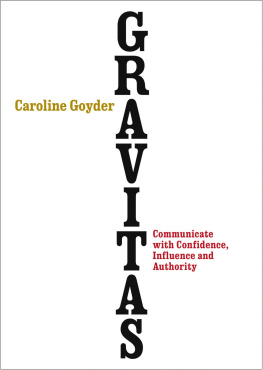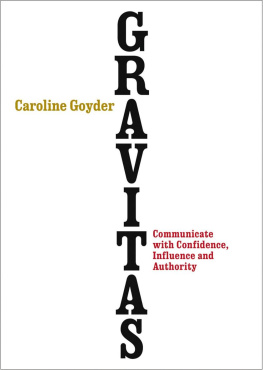Contents
About the Author
Caroline Goyder is a voice, presentation and public speaking expert, and a popular speaker. Caroline has specialised for nearly a decade in helping non-acting clients to perform with poise and power in real life, whether they are delivering a speech, anchoring a TV show, impressing at an interview, or chairing a board meeting. She worked for 10 years as a voice coach at Central School of Speech and Drama, and continues to support clients in business, politics and broadcast with the challenge of communicating with impact in the theatre of life. She is regularly asked to comment in the media on voice and communication issues, and these include BBC Breakfast News, The Speaker, and The Voice. Caroline has also been featured in The Times, The Daily Telegraph, The New Statesman, The Sunday Times, The Guardian and The Economist. Carolines first book The Star Qualities was published by Sidgwick and Jackson in 2009. You can follow her on Twitter @CarolineGoyder and find out more at www.gravitasmethod.com.
About the Book
Have you ever wondered why some people earn attention and respect when they speak and others dont? The secret to their success can be summed up in one word: gravitas.
In this revolutionary new book, leading voice coach and speaker Caroline Goyder reveals how to speak so others will listen. Through simple techniques to build your natural gravitas, you will learn how to express yourself clearly with passion and confidence to persuade, influence and engage listeners. By being grounded in your values and capabilities, you will gain the authority needed to make people sit up and pay attention.
Each chapter guides you step-by-step through practical techniques and exercises to give you the skills for great presentations, productive meetings and persuasive pitches. Youll overcome anxiety, learn how to deal with difficult people and feel calm and in control when public speaking.
An essential tool for the modern workplace, Gravitas will transform the way you think about yourself and your powers of communication.
For Maggie, Rosemary, Scarlett and Grace

This ebook is copyright material and must not be copied, reproduced, transferred, distributed, leased, licensed or publicly performed or used in any way except as specifically permitted in writing by the publishers, as allowed under the terms and conditions under which it was purchased or as strictly permitted by applicable copyright law. Any unauthorized distribution or use of this text may be a direct infringement of the authors and publishers rights and those responsible may be liable in law accordingly.
Version 1.0
Epub ISBN 9781473501447
www.randomhouse.co.uk
1 3 5 7 9 10 8 6 4 2
Published in 2014 by Vermilion, an imprint of Ebury Publishing
Ebury Publishing is a Random House Group company
Copyright Caroline Goyder 2014
Caroline has asserted her right to be identified as the author of this Work in accordance with the Copyright, Designs and Patents Act 1988
All rights reserved. No part of this publication may be reproduced, stored in a retrieval system, or transmitted in any form or by any means, electronic, mechanical, photocopying, recording or otherwise, without the prior permission of the copyright owner.
The Random House Group Limited Reg. No. 954009
Addresses for companies within the Random House Group can be found at www.randomhouse.co.uk
A CIP catalogue record for this book is available from the British Library
ISBN 9780091954956
To buy books by your favourite authors and register for offers, visit www.randomhouse.co.uk
Roots and Wings
What Exactly is Gravitas and How Can it Help You Succeed?
Gravity is the ballast of the soul which keeps the mind steady.
THOMAS FULLER, CLERGYMAN AND WRITER
gravitasn. figuratively of persons, dignity, presence, influence.
Gravity. Gravitas. The clue is in the name. The Roman virtue gravitas existed long before Isaac Newton named the universal force, but great minds think alike.
Gravitas is about roots and wings. Roots, because gravitas gives you a solid foundation to express yourself with confidence and authority. Gravitas flourishes when you stop struggling to be someone else and plant deep roots in who you are. Wings, because as G. K. Chesterton put it, Angels can fly because they take themselves lightly.
We can all have gravitas when we speak. The Roman emperor Marcus Aurelius makes it clear: Cultivate these, then, for they are wholly within your power: sincerity and dignity be temperate in manner and speech; carry yourself with authority. What Marcus understood is that gravitas is a trait software, rather than hardware. You can learn to carry yourself with authority, to speak with gravitas and confidence, to influence others. You have to know how, of course, and thats what this book is about. It will show you practical steps to take to boost your gravitas today, tomorrow and over a lifetime should you wish.
Gravitas allows you to rise to great heights professionally while keeping your feet firmly on the ground. The world notices your substance as well as your style. We listen to you, remember you and act on your words. When you find your roots and your wings the world sits up and pays attention.
Ancient
Perfect virtue; these five things are gravity, generosity of soul, sincerity, earnestness and kindness.
CONFUCIUS, PHILOSOPHER
So, what exactly is gravitas?
Gravitas is a Roman word that translates variously as dignity, impressiveness, seriousness, influence, weight and presence. In ancient Rome gravitas was one of the virtues of a good Roman citizen, along with kindness, hard work, self-worth and, crucially, a sense of humour.
Gravitas (or specifically the rhetorical tradition that taught the ancients how to present themselves with gravitas) prior to the arrival of TV and a couple of world wars had been exceedingly la mode for thousands of years. There was a whole system of voice and body training handed down from Aristotle and Cicero and on via Francis Bacon. It helped people to express themselves with confidence, influence and authority and to succeed in their endeavours.
Gravitas continued to evolve over the centuries and in 1687 it got a rebrand. Isaac Newton published his book The Mathematical Principles of Natural Philosophy, in which he explained the universal force and named it gravity, based on the word gravitas. Did this alter our understanding of the original word?
Possibly. It may be that gravitas came to be understood as weightier because of Newtons coinage of the term. And yet its important to remember that gravity as Newton explained is just as up as it is down. Newtons Third Law of Motion describes the nature of opposing forces. For every push down there must be an equal thrust upwards.
Gravitas requires the same balance of forces. The weight of your seriousness must always be balanced equally by your ability to lighten up humour, humility and wit. Too down and you become all seriousness and theres no spark, no fun, no joy. Too up and you become light as air, insubstantial and no one listens to you because you are not taken seriously.
And then, woefully, for anyone who wanted to learn to express their ideas with clarity and authority, to speak so others listen, the gravitas express hit the buffers in the 20th century, at least as far as the rhetorical tradition that taught the skills was concerned. Helping people speak with power was seen as no longer fit for purpose. The baby of confidence, authority and eloquence was thrown out with the bathwater of elocution. Big mistake.
Next page








